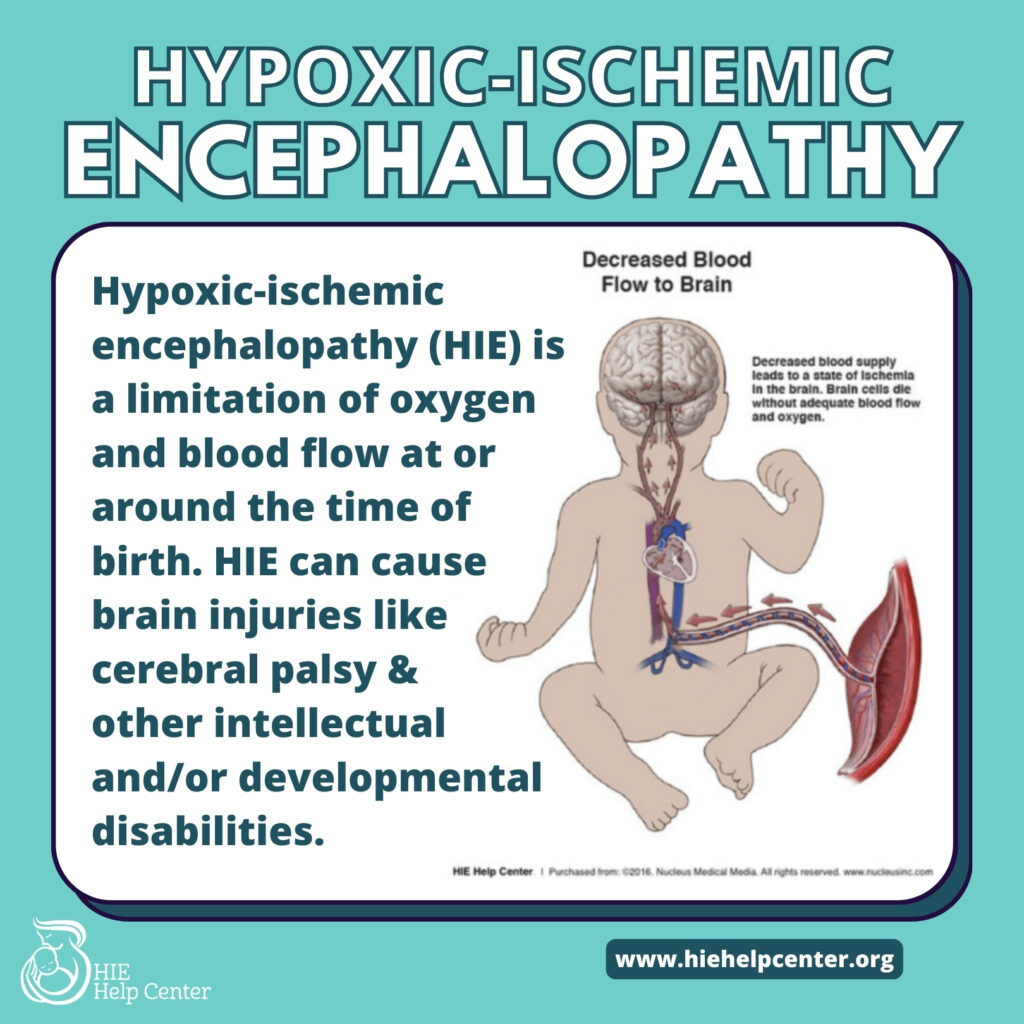Is HIE preventable?
Yes! In many cases, HIE is preventable.
Hypoxic-ischemic encephalopathy (HIE) occurs due to oxygen deprivation before, during, or after birth. To prevent oxygen deprivation, medical professionals must closely monitor the health of babies during pregnancy, the birthing process, and the neonatal period. If an emergency arises, they must act in time. When the medical staff recognizes that a baby is not getting enough oxygen and acts in time, HIE can be prevented.
To prevent HIE, medical staff should first identify the underlying risk factors and causes that can lead to HIE.
Some risk factors for HIE include:
- Umbilical cord complications
- Malpresentation of the baby (baby is in the wrong position)
- Complications with the placenta, uterus, or cervix
- Infections in the mother or baby
- High-risk pregnancy factors like hypertension (high blood pressure), preeclampsia, and diabetes (high blood sugar)
- Premature birth
With careful monitoring and prompt action, these factors can be mitigated and controlled. Many preventable cases of HIE ultimately occur due to the failure on the part of medical professionals to meet the standards of care. This means that the care they provided or the actions they took did not match up to what other qualified, competent doctors would do in similar situations.

How Medical Staff Can Prevent HIE at Birth
If medical professionals are not paying close attention or delay making decisions, the baby can lose oxygen. In many cases, HIE can be prevented by adhering to the following procedures during labor and delivery:
Deliver the baby in time
A baby that is not getting enough oxygen needs to be delivered as soon as possible. If there is an emergency, the baby may need an emergency C-section delivery. A mother with health complications may need an early delivery, and a post-term pregnancy may require medical intervention to ensure the baby is delivered in time.
Pay attention to fetal monitoring
If the baby’s heart rate is abnormal on the fetal monitoring strips, the baby may be in distress and may not be getting enough oxygen. Medical staff should be vigilant for signs of distress and intervene and deliver in time if the baby is not tolerating labor well.
Resuscitate or intubate the baby in time
A baby’s APGAR scores can help medical professionals determine if a baby needs resuscitation.
Recognize and act on other risk factors
There are many risk factors that can lead to HIE. Medical professionals should be mindful of each patient’s situation and potential complications so they can act accordingly.
Communicate with other medical staff
Sometimes medical errors can be due to a failure of basic communication between the various care providers. Results of certain tests or procedures may not be communicated or can get lost, especially during shift changes or between departments. Preventing oxygen deprivation is heavily dependent on medical care providers monitoring for abnormalities and taking immediate action. They must provide appropriate care to their patients, and communicate with each other effectively and in time.
What can parents do?
If your child has HIE, you may want to know if it could have been prevented.
- Ask questions: Go to your doctor with any questions you have about the circumstances around your child’s birth.
- Obtain your child’s medical records: You can get a full collection of your child’s medical records, which will cover every treatment and test your child has had.
- Ask for a third party to review: Medical records are complicated. Reaching out to a third party like another medical professional or an attorney can help provide an unbiased review of what happened.
If you have questions or want to understand your options, the staff at the HIE Help Center is here for you. Call us, text us, or fill out a form to get in touch.
Managing Pregnancy Risk Factors to Prevent HIE
There are several specific measures that can be taken to prevent HIE when risk factors are present. Preventative measures include:

- Prenatal testing – Several tests can be administered to confirm the well-being of the baby, identify risk factors, and ensure that an oxygen-depriving event does not occur.
- Prenatal and neonatal care – Excellent care before, during, and after birth is essential in preventing oxygen deprivation, especially in high-risk pregnancies. Women with high-risk pregnancies may need to be referred to maternal-fetal specialists who can provide more extensive monitoring and care. This is critically important for the health of the mother as well as the baby.
- Fetal heart rate monitoring – A machine is used to assess the fetal status and well-being before and during labor and delivery. A fetal monitor is the best way to tell whether a baby is getting enough oxygen.
- Preventing premature birth – Premature babies are at a greater risk for HIE than are babies born at term because they are underdeveloped and extra sensitive to brain injury from oxygen deprivation. Because of this, certain methods can be used to keep babies inside the womb until they are more prepared for the birthing process and the outside world. Cervical cerclage, progesterone, and magnesium sulfate are three common methods of preventing premature birth.
- Betamethasone – If premature birth cannot be prevented, the corticosteroid betamethasone can be given in-utero to help prepare the premature baby for life outside the womb. It accelerates development of the baby’s organs and tissues.
- Magnesium sulfate – As mentioned already, magnesium sulfate can help to prevent premature birth. It can also be used to instill neuroprotective effects on the fetal brain if premature birth is inevitable.
- C-section delivery – A method of delivery that may be required in order to prevent or relieve fetal oxygen deprivation and HIE.
About the HIE Help Center and ABC Law Centers
The HIE Help Center is run by ABC Law Centers, a medical malpractice firm exclusively handling cases involving HIE and other birth injuries. Our lawyers have over 100 years of combined experience with this type of law, and have been advocating for children with HIE and related disabilities since the firm’s inception in 1997.
We are passionate about helping families obtain the compensation necessary to cover their extensive medical bills, assistive technology, and other necessities.
If you suspect your child’s HIE may have been caused by medical negligence, please contact us today to learn more about pursuing a case. We provide free legal consultations, during which we will inform you of your legal options and answer any questions you have. Moreover, you would pay nothing throughout the entire legal process unless we win.
You are also welcome to reach out to us with inquiries that are not related to malpractice. We cannot provide individualized medical advice, but we’re happy to track down informational resources for you.
Sources
Hypoxic Ischemic Encephalopathy | National Institute of Neurological Disorders and Stroke

